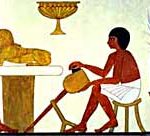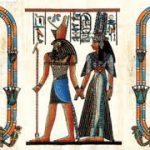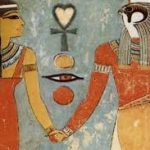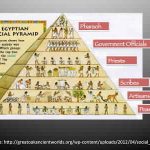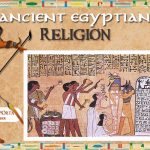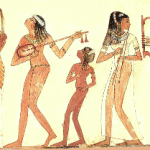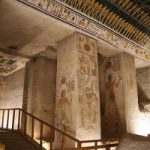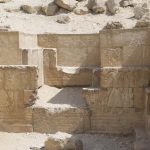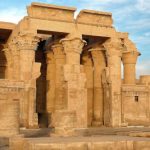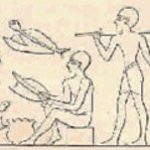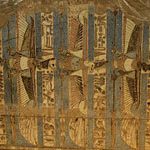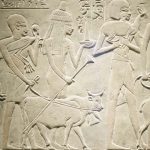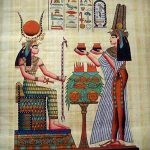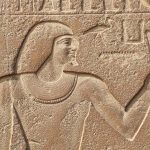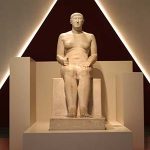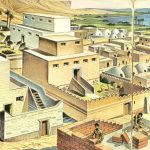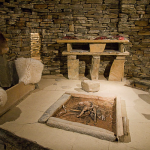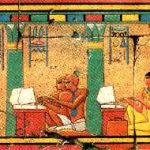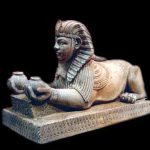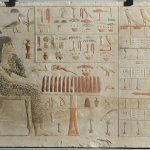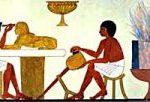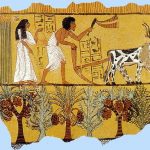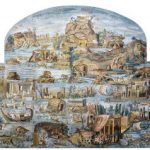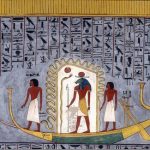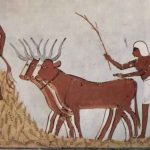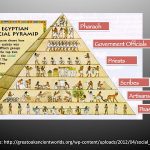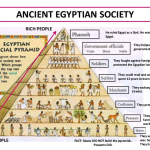Traditionally, the Egyptian economy was based on a barter system right up until the Persian invasion of 525 BCE. Based predominantly on agriculture and herding, the ancient Egyptians employed a monetary unit known as a deben. A deben was the ancient Egyptian equivalent of the dollar.
Buyers and sellers based their negotiations on the deben although there was no actual deben coin minted. A deben was equivalent to roughly 90 grams of copper. Luxury goods were priced in silver or gold debens.

Hence Egypt’s lower social class was the powerhouse producing goods used in trade. Their sweat provided the momentum under which Egypt’s entire culture flourished. These peasants also comprised the annual labour force, which built Egypt’s temple complexes, monuments and the Great Pyramids at Giza.
Each year the Nile River flooded its banks making farming impossible. This freed up the field labourers to go to work on the king’s construction projects. They were paid for their labour
Consistent employment on constructing the pyramids, their mortuary complexes, great temples, and monumental obelisks provided perhaps the sole opportunity for upward mobility available to Egypt’s peasant class. Skilled stonemasons, engravers and artists were in high demand throughout Egypt. Their skills were better paid than their unskilled contemporaries who provided the muscle to move the massive stones for the buildings from their quarry to the construction site.
It was also possible for peasant farmers to enhance their status by mastering a craft to create the ceramics, the bowls, plates, vases, canopic jars, and funerary objects people needed. Skilled carpenters could also make a good living crafting beds, storage chests, tables, desks and chairs, while painters were needed to decorate palaces, tombs, monuments and upper-class homes.
Egypt’s lower classes could also discover opportunities by developing skills in crafting precious gems and metals and in sculpting. Ancient Egypt’s sublimely decorated jewellery, with its predilection for mounting gems in ornate settings, was fashioned by members of the peasant class.
These people, who made up the majority of Egypt’s population, also filled out the ranks of Egypt’s army, and in some rare cases, could aspire to qualify as scribes. Occupations and social positions in Egypt were usually handed down from one generation to another.
However, the idea of social mobility was seen as one worth aiming for and imbued the daily lives of these ancient Egyptians with both a purpose and a meaning, which inspired and suffused their otherwise highly conservative culture.

At the very bottom of Egypt’s lowest social class were its peasant farmers. These people rarely owned either the land they worked or the homes they lived in. Most land was the property of the king, nomarchs, members of the court, or the temple priests.
One common phrase peasants use to start their working day was “Let us work for the noble!” The peasant class consisted almost exclusively of farmers. Many worked other occupations such as fishing or as a ferryman. Egyptian farmers planted and harvested their crops, keeping a modest amount for themselves while giving the majority of their harvest to the owner of their land.
Most farmers cultivated private gardens, which tended to be the domain of the women while the men worked each day in the fields.
Reflecting On The Past
Surviving archaeological evidence suggests Egyptians of all social classes valued life and looked to enjoy themselves as frequently as possible, much as people do today.
Ancient Egyptian Brewers
In ancient Egyptian society, brewers enjoyed high social status. The brewer’s craft was open to women and women owned and managed breweries. Judging by early Egyptian records, breweries seem to have been also entirely managed by women.

Beer was by far the most popular beverage in ancient Egypt. In a barter economy, it was regularly used as payment for services rendered. Workers on the Great Pyramids and mortuary complex on the Giza Plateau were provided with a beer ration three times each day. Beer was widely believed to have been a gift of the god Osiris to the people of Egypt. Tenenet, the Egyptian goddess of beer and childbirth, oversaw the actual breweries themselves.
So seriously did the Egyptian population view beer, that when the Greek pharaoh Cleopatra VII (69-30 BCE) levied a beer tax, her popularity dropped more precipitously for this sole tax than it did during all her wars with Rome.


